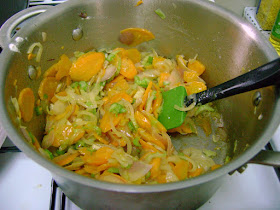In honor of Thanksgiving, the secular holiday of thanks being celebrated across America tomorrow, I'd like to talk about pies. As I've mentioned, I'm no chicken expert, so I won't try to give you too much advice about your turkey. Let me just say: turkey+brine overnight in a clean garbage bag. Oil the skin, cook it hot, then let it rest. Or try Eric Ripert's
Roasted Chicken with Za'atar Stuffing.
But when it comes to pies, I have some experience.
Lets start with the
filling. On of my favorites is apple. I like to take several varieties of apple, but at least half crispy green "granny smith" apples, and slice them thinly. If you don't have an apple corer, you can use a
melon-baller to remove the seeds, but preserve more of the fruit. Then I put it all in a large zip-lock bag and add any of the following: brown sugar, cinnamon, all spice, nutmeg, a little ginger, a dash of salt, vanilla, sometimes orange zest, margarine, flour, or whatever you like, to taste. If you are doing a large amount, you may want to dip the red apples in lemon juice and water to keep them from browning.
The main thing you need to consider with whatever filling you choose is water/juice content. If you use fresh or frozen fruit, make sure that you have enough other ingredients (like flour) to soak up or congeal any liquid that comes out during cooking. Otherwise you will have soup on a soggy crust. Sometimes I add flour to my apple pie filling or sprinkle some between the layers of apple.
If you are using sliced apples, layer the slices in the crust, choosing pieces to best fit together. Have them stack up more in the middle of the pie. Which brings us to...
crusts! You have several options, from the most simple crumble to a fancy lattice work crust. Here is a sampling of some of my favorites, organized according to difficulty.
The first is a simple oatmeal crumble. My friend Leor uses this as a topping for her apple cranberry crisp (8 apples, cinnamon, 1 can cranberry sauce, in a 9"x13" pan). She notes that you may have to adjust the amounts of oatmeal and brown sugar a little so that it is solid. This is a good option if you'd like to use a store-bought graham cracker crust or frozen crust.
- 1 stick of margarine, melted
- 1.5 cups of oatmeal
- 1/2 cup of brown sugar
- a little salt if your margarine is unsalted
- 2 Tbsp of sugar
- 1 teaspoon of cinnamon
Next is a walnut crumb topping I made at my in-law's two years ago. My Mother-in-law found this recipe on
http://www.epicurious.com/. I must admit I was a little offended that she would think I needed a recipe to make apple pie; however, the crumble was outstanding. You can find several variations if you search for apple pie with walnut streusel or walnut crumb.
- 2 tablespoons unsalted butter, softened
- 2 tablespoons firmly packed brown sugar
- 2 tablespoons all-purpose flour
- 1/4 cup chopped walnuts
As we move toward the traditional crust end of the spectrum, I'd like to pass along a recipe that I enjoyed this weekend. It was a very tasty
extra flaky crust that looked like it might be easy to make. Here is the crust recipe:
- 3 cups all purpose flour
- 1/2 teaspoon salt
- 1 cup and 2 tablespoons shortening
- 1/4 cup and 2 tablespoons cold water filling
In a bowl combine flour and salt, cut in shortening. Gradually add cold water tossing lightly with fork, until dough forms a ball. Chill for 30 minutes. On a floured surface roll half of dough to 10 inch circle. Place in 9 inch pie pan. After you fill the pie, roll out remaining pastry to fit top of pie cut slits in top, place over filling . Seal and flute edges. Beat egg yolk with water, brush over pastry. Bake a t 420 degrees 'f'' for 15 minutes. Reduce heat to 350 degrees 'f'. Bake 40 to 45 minutes more or till crust is golden.
And finally we get to the
traditional crust. Tender, flaky, and impressive. I used this recipe the first year I made apple pie (a long, long time ago, in a land far, far away.) But the second year I tried several different awful recipes (including one from the Joy of Cooking), until I finally found the recipe again...on the back side of the instructions for my mom's
pastry cloth and rolling pin cover! If you'd like to start baking pie crusts, delicate cookies, and other pastries, I strongly recommend investing in a pastry cloth or silicone pastry mat, like
this one
with measurements. I would put the pastry cloth and rolling pin cover in the freezer between crusts to help keep everything chilled. Below is
the recipe. Thanks, Dad, for finding it and typing it up!
Mix with fork and set aside:
- 1 large egg
- 1 tablespoon cider vinegar
- ½ cup water
Mix together in large bowl:
- 4 cups flour – unsifted and lightly spooned into measuring cup
- 1 tbsp sugar
- 2 tsp salt
Add to dry using method below:
- 1 ¾ cups shortening
Add 1 cup of shortening to dry mix first, mixing to the size of corn meal. Add ¾ cup shortening mixing to the size of peas. This method produces flakier pastry.
Add the egg mixture over all, as you toss with a fork. Pour out on a sheet of waxed paper.
Draw four corners up and squeeze lightly to form a ball. Separate into 5 balls, cover and store in refrigerator 30 minutes or up to three days. Can be frozen. Makes 5 single crusts.
Too much handling toughens dough.
I think the lattice work might be a good subject for a video. Basically you slice one dough round into even strips and weave them together over the pie. The wider you cut the strips, the less work you'll have, so even though the professionals say 1/2 inch strips, I'd go with about 1 inch strips. Take ever other strip and put it on the pie leaving about 1/2 an inch in between strips. Weave the other strips in just like an elementary school craft project: over, under, over, under.
Here is a good demonstration by 13 year old William in Dallas. You can do it!
Thanks for sticking with me on this pie adventure! I hope you'll eventually try all the techniques I've mentioned. They are each unique and delicious! I want to end by giving thanks to everyone in Israel who has fed us and taught us how to survive in our new land, like the native Americans supposedly helped the Europeans. And thank you to my family in America for putting up with the distance and being supportive of our decision to move to the holy land. I wish they would all hop on a plane and be settled in Israel by next Thanksgiving!
You might also like: Pumpkin Soup,
Mini Cherry Pies (Reduced Fat), and
Fig Marmalade Pie with Low-fat Crust and Lavender Sugar.
 You can now subscribe to my blog by submitting your e-mail address on the upper right side of this blog. Don't forget to click the link in the confirmation e-mail. Try it today!
You can now subscribe to my blog by submitting your e-mail address on the upper right side of this blog. Don't forget to click the link in the confirmation e-mail. Try it today!
















































